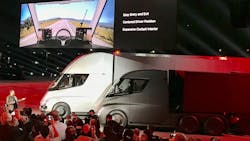For fleets, electrification is far from a slam dunk
Editor's note: This is a continuation of a story posted on Wednesday. Read part 1.
Even as there are segments of the trucking industry that appear ripe for electrification, based on location and length of haul, fleet executives are finding it is far from a slam dunk.
“The deeper we get into this, the more questions that come up,” said Dave Williams, a senior vice president with Knight-Swift Transportation. He said at NACV his company runs 300 trucks at the Port of Los Angeles, which is at the forefront of electric truck operations in the United States.
Incentives can help to lower the cost of electric trucks, but the land required for the infrastructure of charging stations and the time required for powering up are among the concerns the truckload carrier is working through.
Even in cases where local utilities are offering “free” charging stations, the overall investment could still “end up being millions of dollars,” Williams suggested.
Battery-electric trucks are required to charge where these stations are located, as opposed to filling a diesel-powered truck at any fueling station in the country.
Williams added that it remains unclear how the trucks will perform, how far they truly will be able to travel, and how much they will cost. And at the same time, they are under pressure to commit 18 months in advance in order to get the charging infrastructure in place.
In the end, Williams said it could be a “strong play” over time, but he recommended tempering expectations based on the range limitations, the weight of batteries, and other factors.
Utilities, meanwhile, are still working to determine the required amount of electricity fleets will need, and how that could impact the overall grid. In response, manufacturers are getting involved in more than creating vehicles. They are starting to provide value-add services such as consulting and custom planning to help all sides gradually find success with electric commercial vehicles.
In addition, companies including Hyliion are developing various electric-hybrid systems for heavy-duty trucks that basically turn a 6x2 truck into a 6x4 hybrid.
Founder and CEO Thomas Healy said he does not believe fully electric trucks will be utilized in significant numbers beyond short haul movements any time soon.
Instead, he sees a system where fuel can be burned locally on a vehicle to produce electricity for driving.
Ultimately, it remains unclear at this early stage how much battery electric, hydrogen fuel cell, natural gas or other alternative-fueled trucks eat into diesel’s dominance.
What is clear, however, is that 10 years from now, the air will be even cleaner than it is today as all of these options mature.
About the Author
Neil Abt
Neil Abt is a former FleetOwner editor who wrote for the publication from 2017 to 2020. He was editorial director from 2018 to 2020.
